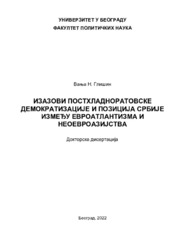Приказ основних података о дисертацији
Изазови постхладноратовске демократизације и позиције Србије између евроатлантизма и неоевроазијства
Challenges of post Cold War democratization and Serbia's position between Euro-Atlanticism and Neo-Eurasianism
| dc.contributor.advisor | Stojiljković, Zoran | |
| dc.contributor.other | Despotović, Ljubiša | |
| dc.contributor.other | Jovanović, Milan | |
| dc.contributor.other | Samardžić, Slobodan | |
| dc.contributor.other | Matić, Petar | |
| dc.creator | Glišin, Vanja | |
| dc.date.accessioned | 2023-09-06T11:05:16Z | |
| dc.date.available | 2023-09-06T11:05:16Z | |
| dc.date.issued | 2022-06-12 | |
| dc.identifier.uri | https://uvidok.rcub.bg.ac.rs/bitstream/handle/123456789/5171/Referat.pdf | |
| dc.identifier.uri | https://eteze.bg.ac.rs/application/showtheses?thesesId=9167 | |
| dc.identifier.uri | https://fedorabg.bg.ac.rs/fedora/get/o:30477/bdef:Content/download | |
| dc.identifier.uri | https://plus.cobiss.net/cobiss/sr/sr/bib/120914441 | |
| dc.identifier.uri | https://nardus.mpn.gov.rs/handle/123456789/21612 | |
| dc.description.abstract | Предмет истраживања у овој студији тиче се изазова постхладноратовске демократизације у контексту геополитичког положаја Србије између евроатлантизма и неоевроазијства. Истраживање полази од претпоставке да се на процес демократизације и динамику политичке модернизације у Србији од 1990. до 2020. године одражава преплитање интереса евроатлантизма и неоевроазијства. Према томе, циљ рада је аргументовано објашњење узрочно-последичних веза спољних и унутрашњих фактора, односно процеса демократизације и геополитичког надметања евроатлантизма и неоевроазијства на простору Србије. Унутрашњи аспект анализе тиче се постхладноратовске демократизације Србије, која је формално успоставила вишестраначки систем 1990. године, али је на снази била ауторитарна демократија. Узроци опстанка ауторитарног режима уједно представљају изазове демократским променама у Србији, до којих долази једну деценију касније, 5. октобра 2000. године. Од тада до 2012. године бележи се модернизација државних и друштвених капацитета и успон демократије. Међутим, демократизација као нелинеаран процес доживљава кризу и поновно слабљење након 2012. године, услед сложених политичких и геополитичких околности са којима су се суочили политички и друштвени актери демократске транзиције у Србији. Спољни аспект истраживања тиче се спољнополитичких фактора који су се одражавали на процесе демократизације и модернизације Србије. У контексту постхладноратовске глобалне транзиције из биполаризма у униполаризам, Србија се суочила са економским, политичким, дипломатским и војним интервенцијама што јој је отежавало спољнополитичку позицију и ограничавало унутрашњеполитичке модернизацијске капацитете. Повољнија позиција бележи се након демократских промена, будући да је држава изашла из политичке и економске изолације, али се, упоредо са тим, нашла пред новим изазовима попут питања европских интеграција, статуса Косова и Метохије и сарадње са судом у Хагу. Наведена питања поларизовала су политичку сцену Србије на европрагматике и евроскептике, да би, након активације руске дипломатије у контексту решавања косовко-метохијског питања, дошло до конфронтације евроатлантизма и неоевроазијства на овом простору са импликацијама на динамику процеса демократизације и модернизације. | sr |
| dc.description.abstract | The subject of research in this study concerns the challenges of post-Cold War democratization in the context of Serbia's geopolitical position between Euro-Atlantism and Neo-Eurasianism. The research starts from the assumption that the process of democratization and the dynamics of political modernization in Serbia from 1990 to 2020 reflects the intertwining of the interests of Euro-Atlanticism and Neo-Eurasianism. Therefore, the goal of the paper is an argumentative explanation of the cause-and-effect relationships of external and internal factors, that is, the process of democratization and geopolitical competition between Euro-Atlanticism and Neo-Eurasianism on the territory of Serbia. The internal aspect of the analysis concerns the post-Cold War democratization of Serbia, which formally established a multi-party system in 1990, but authoritarian democracy was in force. The reasons for the survival of the authoritarian regime also present challenges to the democratic changes in Serbia, which took place one decade later, on October 5, 2000. From then until 2012, the modernization of state and social capacities and the rise of democracy were noted. However, democratization as a non-linear process experienced a crisis and weakened again after 2012, due to the complex political and geopolitical circumstances faced by the political and social actors of the democratic transition in Serbia. The external aspect of the research concerns the foreign policy factors that were reflected in the processes of democratization and modernization of Serbia. In the context of the post-Cold War global transition from bipolarism to unipolarism, Serbia faced economic, political, diplomatic and military interventions, which made its foreign policy position difficult and limited its internal political modernization capacities. A more favorable position was recorded after the democratic changes, since the country came out of political and economic isolation, but, at the same time, faced new challenges such as the issue of European integration, the status of Kosovo and Metohija, and the cooperation with the court in Hague. The aforementioned issues polarized the political scene of Serbia between Europragmatics and Eurosceptics, so that, after the activation of Russian diplomacy in the context of solving the Kosovo-Metohija issue, there would be a confrontation between Euro-Atlanticism and neo-Eurasianism in this area with implications for the dynamics of the democratization and modernization process. | en |
| dc.format | application/pdf | |
| dc.language | sr | |
| dc.publisher | Универзитет у Београду, Филозофски факултет | sr |
| dc.rights | openAccess | en |
| dc.source | Универзитет у Београду | sr |
| dc.subject | демократизација | sr |
| dc.subject | democratization | en |
| dc.subject | modernization | en |
| dc.subject | geopolitics | en |
| dc.subject | Serbia | en |
| dc.subject | Euro-Atlanticism | en |
| dc.subject | Neo-Eurasianism | en |
| dc.subject | Russia | en |
| dc.subject | United States of America | en |
| dc.subject | модернизација | sr |
| dc.subject | геополитика | sr |
| dc.subject | Србија | sr |
| dc.subject | евроатлантизам | sr |
| dc.subject | неоевроазијство | sr |
| dc.subject | Русија | sr |
| dc.subject | Сједињене Америчке Државе | sr |
| dc.title | Изазови постхладноратовске демократизације и позиције Србије између евроатлантизма и неоевроазијства | sr |
| dc.title.alternative | Challenges of post Cold War democratization and Serbia's position between Euro-Atlanticism and Neo-Eurasianism | en |
| dc.type | doctoralThesis | |
| dc.rights.license | ARR | |
| dc.identifier.fulltext | http://nardus.mpn.gov.rs/bitstream/id/151753/Disertacija_13630.pdf | |
| dc.identifier.fulltext | http://nardus.mpn.gov.rs/bitstream/id/152455/Referat.pdf | |
| dc.identifier.rcub | https://hdl.handle.net/21.15107/rcub_nardus_21612 |



